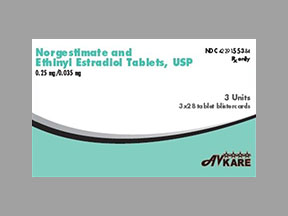Mili is a limited distribution medication.

Mili Coupons & Savings Card – Discount Prices from $19.93
Brand for: Norgestimate-eth estradiol
My prescription
Edit
0.25-35MG-MCG, Norgestimate-eth Estradiol (84 Tablets)
Select pharmacy

CVS
$31.21
COUPON PRICE
Walmart
$19.93
COUPON PRICE
Albertsons
$25.33
COUPON PRICE
Walgreens
$28.92
COUPON PRICEMili savings card
Show this card to your pharmacist
Walmart
$19.93
BIN
ID
PCN
GRP
019876
LH66ADC0E1
CHIPPO
LHX
Powered by
Price history for Mili (brand) & Norgestimate-eth Estradiol (generic)
84 Tablets, 0.25-35MG-MCG
Average retail price for Mili
Average retail price for Norgestimate-eth Estradiol
Average SaveHealth price for Norgestimate-eth Estradiol
Our price history data is based on aggregated prescription data collected from participating pharmacies in America. Our prescription data updates daily to reflect the latest price changes. If you notice a missing data point, it means there wasn't sufficient data available to generate a monetary value for that date.
Over the last 12 months, the average discount price of Mili is $22.32 using the SaveHealth savings card. That's an average savings of 76.24% on Mili with our discount card.
*Retail prices are based on pharmacy claims data, and may not be accurate when we don't have enough claims.
Mili (Norgestimate-eth Estradiol) dosage forms
Dosage Quantity Price from Per unit 0.25-35MG-MCG 84 Tablets $19.93 $0.24 0.25-35MG-MCG 28 Tablets $6.14 $0.22 0.25-35MG-MCG 2016 Tablets $144.03 $0.07
| Dosage | Quantity | Price from | Per unit |
|---|---|---|---|
| 0.25-35MG-MCG | 84 Tablets | $19.93 | $0.24 |
| 0.25-35MG-MCG | 28 Tablets | $6.14 | $0.22 |
| 0.25-35MG-MCG | 2016 Tablets | $144.03 | $0.07 |
What is the drug Mili?
Mili is a combination oral contraceptive pill that contains ethinyl estradiol and norgestimate. It is used to prevent pregnancy by inhibiting ovulation, altering the cervical mucus, and changing the uterine lining to prevent fertilization and implantation.
What are the most common side effects of Mili?
The most common side effects of Mili, a combination oral contraceptive, include nausea, headache, breast tenderness, and irregular bleeding or spotting. Some individuals may also experience mood changes, weight gain, or changes in libido. It is important to consult a healthcare provider if any side effects are severe or persistent.
Using the SaveHealth discount card, what is the price of Mili without insurance?
Using the SaveHealth discount card, the price of Mili without insurance is $19.93.
What is the price of Mili at CVS?
The price of Mili at CVS is $31.21.
What is the price of Mili at Walgreens?
The price of Mili at Walgreens is $28.92.
What is the price of Mili at Walmart?
The price of Mili at Walmart is $19.93.
